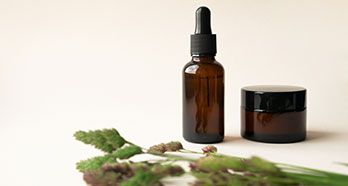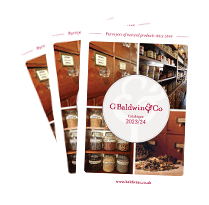The Benefits of Herbal Teas: The Ultimate Guide
For centuries, herbal teas have been used around the world as natural remedies for various health conditions. As interest in integrative medicine and holistic health continues to grow, more and more people are discovering the benefits of using herbal teas to aid an healthy lifestyle.
In this comprehensive guide, we delve into the world of herbal teas, uncovering their diverse benefits and guiding you towards selecting the perfect brews from Baldwins to enhance your daily ritual.
Why Herbal Teas Matter
Herbal teas, often referred to as tisanes, are derived from a fascinating array of plants, flowers, and herbs. Unlike traditional tea leaves, herbal teas are typically caffeine-free and present an opportunity to indulge in flavours that vary from soothing and earthy to vibrant and invigorating. Yet, the allure of herbal teas extends beyond taste, encompassing a host of health benefits tailored to different needs. Drinking herbal teas like chamomile, peppermint, and ginger tea can provide a host of health benefits.
9 Herbals Teas and Their Benefits For Your Health
These teas are packed with nutrients and compounds that can help improve heart health, aid digestion, enhance sleep quality, and more! Let's take a look at some of our favourite teas and their benefits:
Chamomile Tea
![]()
Chamomile Tea - Chamomile is frequently used for its calming and mildly sedative effects. The herb contains apigenin, an antioxidant that binds to receptors in the brain that may promote relaxation and reduce anxiety. Sipping a hot cup of chamomile tea before bed can help you unwind and get better sleep. Chamomile is also known to ease menstrual cramps, stomach pains and nausea. Keep some chamomile tea bags handy for when anxiety or indigestion strikes.
Peppermint Tea
![]()
Peppermint Tea - is one of the most widely consumed herbal teas, and for good reason. Menthol, the active ingredient in peppermint has analgesic, antispasmodic and soothing effects on the digestive system. Peppermint tea can aid digestion, relieve gas and bloating, and ease stomach upset. The menthol in peppermint also helps to calm coughs and clear congestion. Enjoy a cup of peppermint tea after meals or any time your digestion needs a boost.
Oolong Tea
![]()
Oolong Tea - is made from leaves of the Camellia sinensis plant like green and black teas, but is only partially fermented. This gives oolong a unique flavour and antioxidant content somewhere between green and black tea. Drinking Oolong tea may help lower cholesterol, control blood sugar, improve heart health, and aid weight loss. The polyphenols in Oolong may also prevent tooth decay and strengthen bones.
Hibiscus Tea
![]()
Hibiscus Tea - Made from the bright red hibiscus flower, this ruby-coloured tea is high in vitamin C and antioxidants. Studies show that hibiscus may lower blood pressure and cholesterol levels, likely due to its anti-inflammatory and diuretic effects. Of all the herbal teas, hibiscus packs the biggest punch of health-promoting flavonoids. Enjoy hibiscus tea hot or iced, or use the dried flowers to make a refreshing, tangy agua fresca.
Rose Tea
![]()
Rose tea - A fantastic source of antioxidants that can naturally support your immune system. Not only that, but this fragrant tea can also work wonders as a natural relaxant, helping to reduce feelings of stress and anxiety. Thanks to its unique compounds, rose tea has a calming and sedative effect on the body, making it the perfect choice for those looking to unwind after a long day.
Ginger Tea
![]()
Ginger Tea - Ginger root has been used for centuries in Eastern medicine to treat a variety of ailments. Ginger tea can ease nausea, motion sickness, morning sickness, and other types of upset stomach. Compounds called gingerols give ginger its unique heat and anti-inflammatory properties. A cup of ginger tea may provide relief from arthritis pain, menstrual cramps, sore muscles and other inflammatory conditions. Its warming effects also make ginger tea an ideal cold-weather drink.
Green Tea
![]()
Green Tea - has become extremely popular due to its many evidence-based health benefits. It contains epigallocatechin gallate (EGCG), an antioxidant that may prevent cellular damage and lower the risk of chronic diseases like cancer and heart disease. Drinking green tea may also enhance weight loss, improve insulin sensitivity, and stimulate the immune system. Choose high-quality Japanese green tea for the highest concentration of EGCG antioxidants.
Turmeric Tea
![]()
Turmeric Tea - has anti-inflammatory properties that rival those of green tea. Curcumin, the active compound in turmeric, may help relieve pain from arthritis, muscle soreness and other inflammatory conditions. Turmeric tea also supports healthy liver function and aids detoxification. Add freshly grated turmeric root or pure turmeric powder to black tea or lattes for a spicy, earthy brew.
Rooibos Tea
![]()
Rooibos Tea - Also called red bush tea, rooibos is made from the leaves of a South African shrub. Rooibos is naturally caffeine-free and low in tannins, making it a good choice before bedtime. Rooibos contain unique antioxidants called aspalathin and nothofagin that may help regulate blood sugar and promote heart health. The pleasant, slightly sweet taste of rooibos makes it a delicious base for fruit or spice-infused herbal blends.
Discover our full range of herbal teas here.
Creating Your Herbal Tea Experience
![]()
There are many different ways to enjoy herbal teas. You can brew them hot or cold, then add your favourite fruits, herbs, or spices such as cinnamon or cardamom to enhance the flavour. Here are a few tips for creating your perfect herbal tea experience:
- Choose the right tea for your needs. Chamomile or lavender are good choices if you are looking for a calming tea. Peppermint or ginger are good options if you want a tea to improve digestion.
- Use fresh water. Using fresh, cold water will help to bring out the best flavour in your tea.
- Use the right amount of tea, whether your tea is in a bag or loose form. The amount of tea you use will depend on the strength you prefer. A good starting point is one teaspoon of tea per cup of water.
- Steep the tea for the correct amount of time. The steeping time will vary depending on the type of tea you are using. Chamomile tea only needs to steep for a few minutes, while ginger tea may need to steep for 10 minutes or more.
- Enjoy! Herbal teas can be enjoyed hot or cold. More on Herbal Teas can be found in this blog here.
Herbal Teas Benefits - Final Thoughts
At Baldwins, we believe in the holistic power of nature to enrich your well-being, and in this fast-paced world, it's essential to take moments to focus on self-care for our well-being. There is no doubt that herbal teas are delicious and a source of antioxidants to support your health.
So, steep your herbal tea, take a moment to relax, and embrace the undeniable benefits of herbal teas for your well-being journey.







 Looking for Qualified Advice on Herbs & Supplements?
Read our health guides, quick tips and popular posts on a range of health conditions, products & fitness
Looking for Qualified Advice on Herbs & Supplements?
Read our health guides, quick tips and popular posts on a range of health conditions, products & fitness
 At number 64, our Walworth Road Shops are featured in Time out London’s
100 best shops and we couldn’t be more delighted!
At number 64, our Walworth Road Shops are featured in Time out London’s
100 best shops and we couldn’t be more delighted!

 View our Catalogue online.
It is stocked full of our latest oils, beauty products, health foods & gifts.
View our Catalogue online.
It is stocked full of our latest oils, beauty products, health foods & gifts.